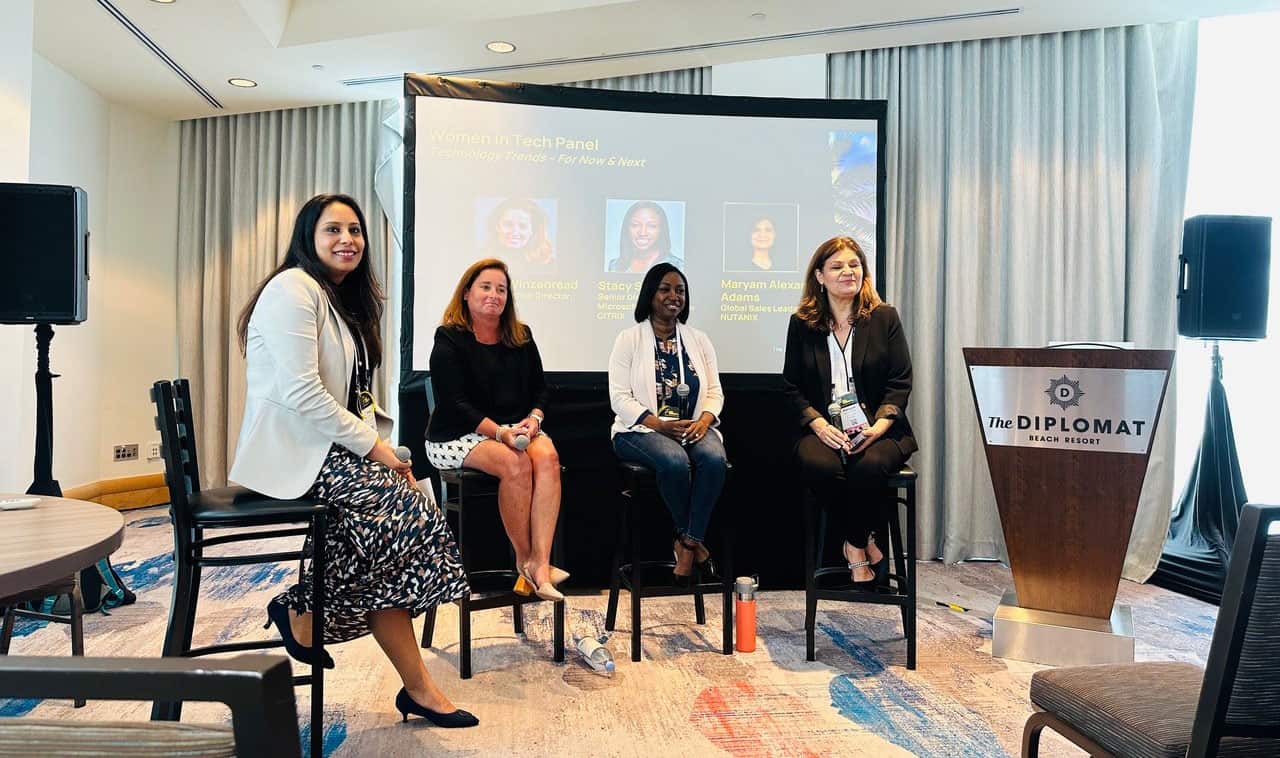IGEL Blog

Navigating the Future of Work: Insights from a Panel Discussion on Technology, Diversity, and Women in Leadership

A few weeks ago, I had the privilege of moderating an enlightening panel on Women in Technology at the IGEL DISRUPT 24 event in Miami. The panel comprised three exceptional women leaders: Patty Winzenread, Senior Director and General Manager for Healthcare at Lenovo; Stacy Scott, Senior Director of Microsoft Business Development at Citrix; and Maryam Alexandrian-Adams, Global Sales Leader for EUC at Nutanix.
During the panel session, we discussed the changing nature of work in the aftermath of the COVID-19 pandemic. Our conversation centered around the growing trend of hybrid and remote work models. Additionally, we explored the crucial role of AI development, emphasized the significance of diversity in the workplace, and delved into the distinct challenges and opportunities that women face in technology and leadership positions.
The insights and experiences shared by our panelists left me feeling motivated and encouraged about what’s next for EUC and the important role that women play in shaping the future of work.
The Shift to Hybrid and Remote Work
The COVID-19 pandemic has undoubtedly hastened the implementation of remote work, compelling organizations to reconsider their work models and adopt more flexible arrangements. Patty Winzenread and Stacy Scott pointed out how the health crisis fueled innovation in healthcare technology and led to an unexpected rise in the adoption of Virtual Desktop Infrastructure (VDI).
Maryam Alexandrian-Adams contributed to the discussion, sharing insights on how VDI has become a necessity in the post-pandemic work environment, but also highlighted how there have been differing opinions regarding the transition to hybrid and remote work.
Scott, who has been with Citrix for 20 years, noted that during her time there, she has observed significant changes in work culture, especially in the past few years. While the pandemic initially brought people together and fostered a sense of unity and adaptability in remote work, there has been a surprising reversal as many companies have begun to adopt return-to-office strategies.
Debates around work-from-home policies and the search for a balanced approach to remote and in-office work have become common. Striking the right balance between returning to the office and accommodating employees’ preferences for hybrid work is challenging. However, the panelists agreed that the hybrid model, if managed correctly, could improve work-life balance.
The Role of AI in Shaping the Future of Work
During the panel discussion, the attendees discussed the inclusion of AI in the workplace. They stressed the importance of security, ethical development, and the potential of AI to create more inclusive and equitable meeting experiences.
Alexandrian-Adams emphasized AI’s pervasive and evolving nature in the business world, highlighting its potential for enhancing productivity and decision-making across various sectors such as healthcare and financial services. She also noted the challenges, especially regarding security risks like ransomware, exacerbated by the rapid adoption of remote work practices during the pandemic. She explained that the lack of initial policies and procedures for secure operations is a concern. She showed cautious optimism while recognizing AI’s benefits and stressing the importance of governance to prevent negative outcomes.
The panelists also discussed the significance of diverse data sets and human supervision in AI development to prevent bias and ensure that technology serves everyone equitably. Additionally, the conversation highlighted the advantages and disadvantages of AI and automation, noting that while together they can streamline operations and create leadership opportunities for a more diverse group of candidates, there is also a risk of disproportionately affecting women’s jobs. To counter this risk, Alexandrian-Adams identified upskilling as a crucial strategy.
Gender Perspectives in Problem-Solving and Leadership
During the conversation, an intriguing topic was the differences in problem-solving approaches between genders in the workplace. Scott emphasized the significance of having different perspectives when making decisions. She stressed the importance of actively seeking out various mentors, including both successful women and male mentors, to gain diverse perspectives on problem-solving and career advancement. She went on to share that learning from male mentors helped her discover a different approach to tackling problems and planning, characterized by less overthinking and more proactive action.
Scott went on to explain that despite some initial reservations about the “seeking forgiveness rather than asking for permission” approach, it proved to be a valuable mindset shift for her, especially in overcoming self-imposed and gender-based limitations. Scott advised that women should adapt some of the straightforward, action-oriented strategies of their male counterparts to their own style without feeling the need to know everything before taking on challenges. For male allies, she stressed the importance of proactive mentorship and support for women, encouraging them to offer guidance and help without waiting to be asked, as this can significantly ease the barriers women might face in seeking mentorship and advancing their careers.
This diversity is beneficial and essential for fostering innovation and empathy within organizations. Winzenread shared with us the importance of developing a squad of people you trust and have different experiences. She noted that these people can be advisors as you navigate life or move along in your career, adding how mentorship impacted her and that she is in the position she is in today at Lenovo because of an ally who empathized and advocated for her.
Winzenread added that she advises the women she works with, especially those she has mentored, to make the most of their unique strengths. She pointed out that we all have different talents, and it’s important to leverage these assets to our advantage. Our gender is a part of who we are, so we should embrace it and make it a strength.
Alexandrian-Adams spoke about the importance of self-confidence and having a voice, especially for women and minorities in the workplace. She emphasized that people often limit themselves unnecessarily and stressed the significance of having a point of view and building credibility in areas where one has expertise. She also observed the challenges that women face in the technology sector and other industries, such as balancing caregiving responsibilities with work. She suggested that remote and hybrid work models offer solutions that call for more support for women by creating work environments conducive to their needs, recognizing their achievements, and providing necessary training or support. This approach benefits not only women but also enhances the productivity and diversity of the organization, she added.
Concluding Thoughts
The panel discussion ended on a positive note, highlighting the significant role of women in shaping the future of technology. It was emphasized that as the industry progresses, the insights shared by each of these leaders reinforce the critical role women play in driving innovation and adapting to new challenges.
The key takeaway for me from this panel is that, as an industry, we need to embrace flexibility, leverage the diverse talents and unique strengths that surround us, and promote an inclusive culture. I’ve also learned that it’s crucial for us to continuously enhance our skills in these current trends, enabling us to leverage them as tools rather than viewing them as threats. These are not only moral imperatives but strategic advantages that will define what’s next for EUC.


